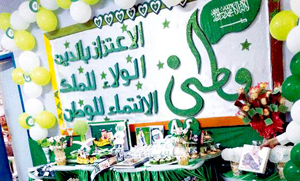Riyadh, Sep 23: Today is a proud moment for all the people residing in Saudi Arabia, which is celebrating its 84th National Day, the anniversary of the glorious unification by great visionary King Abdul Aziz Al-Saud, the founder of the modern Kingdom in 1932.
Declared as a national holiday, the occasion is very special to the citizens as well as to the huge number of expatriates residing in this beautiful Kingdom to cherish all the gigantic achievements that have been accomplished in a country, whose religion is Islam, development a vision and justice a ruling method.
On this auspicious occasion, the Saudi citizens feel very grateful to the founding father for laying a strong foundation for the ongoing journey of the modern Kingdom and express their gratitude for all the great efforts he made to unify the Kingdom on the basis of Kalima e Shahadah, which the national flag bears with the Arabic testimony of the faith — “La ilaha il Allahu — Muhammadur Rasulullah — there is no god worthy of worship except the Almighty Allah and prophet Muhammad (peace be upon him) is His messenger.”
Expressing his sentiment, Waddah Abdul Kader Omran, a Saudi national working as manager with McDonald’s, Saudi Arabia, told Arab News: “I am thankful to Almighty Allah for bestowing safety and security on us as we live in complete solidarity and peace. We are fortunate that we got good leadership in King Abdul Aziz, the founder of our modern unified Kingdom... as we all know we used to be in a different and divided rule on this piece of land for so many years but in 1932 we finally got our unified Kingdom. This was due to the great efforts of our visionary leader and from that day, we are celebrating our National Day with great zeal and zest each year on Sept. 23 to mark the beautiful occasion with traditional fervor and gaiety.”
Abdullah Inayat, a Riyadh-based PR executive, commented: “We are celebrating our 84th National Day with great zeal to cherish all the achievements that we have accomplished in the successful journey so far under the wise and brave leadership of our successive frontline leaders from our founder King Abdul Aziz to Custodian of the Two Holy Mosques King Abdullah. I pray Almighty Allah to bestow His blessings and all good things on our flourishing Kingdom.”
The huge number of expatriate workers of different nationalities, who have adopted the Kingdom as their second home, feel equally excited on the occasion of the National Day.
Various diplomatic missions here have greeted the Saudi government and people for the National Day anniversary.
Sharing his sentiments, Ebrahim Edries, consul general of South Africa, told Arab News: “Celebrating the Saudi National Day is important as celebrating national values appropriately is significant in forging national unity. We thus join all Saudis to celebrate their National Day with pride and enthusiasm,” he added.
The expatriates are thankful to the king, the crown prince and the Saudi authorities for all the humanitarian support extended to them for residing and working in the Kingdom. Speaking to Arab News, Mohammed Quaiser, a non-resident Indian working in the Kingdom for two decades, who also heads a voluntary organization of NRIs here, said: “The Kingdom is generous and has donated immensely to help develop the Muslim and Arab nation under its successive frontline leadership over the years. As an Indian and member of the largest expatriate community in Saudi Arabia, I have great respect and admiration for the visionary Saudi leadership and the Ummah it has been supporting, and wish all the success to this great Kingdom,” he added.
Akhatar ul-Islam Nadwi, an NRI staying in Riyadh for several years who is active in the community, said he has full admiration for the Kingdom, which accommodates people of all nationalities to live in peace and harmony.
He added: “I have great respect for the Saudi leadership and founder of its modern day Kingdom for all the great efforts they made for unification of this pious land and their struggle to give a better future to the upcoming generation....long live Saudi Arabia.”
Abdullah Ahmad, a Sudanese worker, who has grown up in the Kingdom, said he really admired the way this beautiful Kingdom has reached the age of peace and prosperity; all praise to Almighty Allah and the visionary leadership of the Kingdom for the huge success story they have written for their nation.
“Congratulations to the people of Saudi Arabia on the occasion of the anniversary of their unification.”





Comments
Add new comment